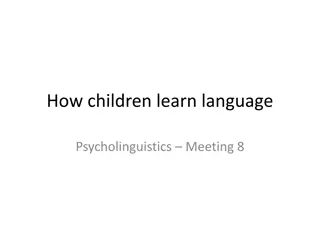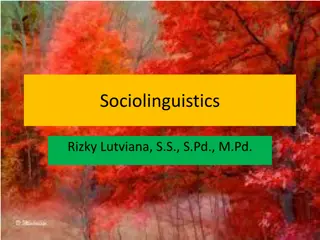Factors Influencing Language Acquisition in Learners
Factors such as affect, motivation, self-confidence, anxiety, and attitude play crucial roles in language learners' acquisition process. High motivation, self-confidence, and low anxiety levels enhance effective language acquisition, while positive attitudes towards learning facilitate seeking and processing input for successful language learning. Understanding and managing these factors can significantly impact a learner's language acquisition journey.
Download Presentation

Please find below an Image/Link to download the presentation.
The content on the website is provided AS IS for your information and personal use only. It may not be sold, licensed, or shared on other websites without obtaining consent from the author. Download presentation by click this link. If you encounter any issues during the download, it is possible that the publisher has removed the file from their server.
E N D
Presentation Transcript
Affect -a feeling or emotion In language learners feelings or emotional reactions to the language about the people who speak the language about the culture in which the language is spoken to the classroom situation or experience
Motivation Self-confidence Anxiety Attitude Can help or hinder comprehensible input Can block comprehensible input
High motivation usually = effective acquisition 2ndstrongest predictor of success after aptitude Includes having a goal making an effort to achieve the goal a desire to achieve the goal favorable attitudes toward the activities needed to achieve the goal. Can change over time and depending on the context We try hardest for things we find challenging but not impossible to achieve.
Self-confidence + a good self-image = effective acquisition Self-confidence and self-image are related to the language learners ability to take risks how the learner deals with uncertain situations how they view the possibility of failure Determination of risk of failure also based on student s evaluation of the situation. One learner may see the situation as a gain and the other as a loss.
Low anxiety (personal or classroom) = effective acquisition Balance Too much anxiety can impede acquisition. No anxiety can be an uncaring or unconcerned attitude Different types of anxiety have different effects social anxiety can inhibit behavior and have a negative impact on successful interactions in the language classroom intense anxiety directs one s attention to physical features of words and takes attention away from meaningful use of language anxiety about performing (concerns about looking foolish, or being wrong) can negatively impact the learner s acquisition
Attitude are not optimal for SLA seek less input high affective filter Attitude conducive to SLA seek and obtain more input will have a low affective filter
Can cause a learner to stall even if they are getting good input Responsible for individual variations in SLA When low, students are relaxed and engaged in the lesson, even messages that are not easy to comprehend can trigger the acquisition process
One function is to determine what parts of the language will be attended to and in what order. (Dulay, Burt, & Krashen, 1982) No hard evidence of how the filter works Raises the questions: How is input filtered out by an unmotivated learner? How can affect be selective in terms of grammatical structures?
Freeman, D. & Freeman, Y. (2014). Essential linguistics. Portsmouth, NH: Heinemann. Gass, S. & Selinker, L. (2008). Second language acquisition. NY: Routledge. Krashen, S. (1981). Principles and practice in second language acquisition. Oxford: PergamonPress.

 undefined
undefined




























